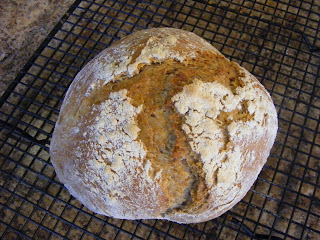Monday, March 26, 2012
Lobster Tails, Shrimp Cocktail and Rye Bread
Lobster (Four 4 ounce tails, with the shell on, serves 2)
Add 1/2 cup white wine to a kettle. Heat to boiling, lay lobsters in the wine. Cover, reduce heat to simmer, and wait 7-8 minutes. Serve with melted butter.
Nutritional data (6 ounces of lobster meat from two tails):
Calories: 167
Fat: 1g
Sat fat: 0.2g
Chol: 123mg
Sodium: 647mg
Carbs: 2.2g
Fiber: 0g
Protein: 34.9g
Shrimp Cocktail
Serves 4
1 cup ketchup
1 tablespoon prepared horseradish
1 tablespoon lemon juice
1 pound shrimp (any size) Buying them peeled and deveined makes the work easier.
1. If the shrimp are frozen, thaw them. If fully cooked, move to step three.
2. If raw, bring a kettle water to a boil. When boiling add the shrimp. Shrimp are done in 1-3 minutes, depending on how big your kettle is (bigger kettles with more water will cook faster.) Shrimp will be bright white and orange when done. Do not over cook. Drain into a colander and let them drip.
3. Mix remaining ingredients.
4. Serve. Enjoy.
Nutritional data (6 ounces of lobster meat):
Calories: 100
Fat: 1g
Sat fat: 0g
Chol: 140mg
Sodium: 135mg
Carbs: 0g
Fiber: 0g
Protein: 19g
Homemade Rye Bread
Make four 1 pound loaves, 10 slices per loaf
3 cups lukewarm water
2 packets of bread yeast
1/2 tablespoon kisher salt
5 1/2 cups unbleached all-purpose flour
1 cup rye flour
1. In a 4-5 quart container (with a lid that you can loosely cover--I like to use a 5 quart ice cream pail) add the water, yeast and salt. Mix together to help the salt dissolve and the yeast rehydrate.
2. Scoop and scrape all the flour (both types) and add into the water.
3. With a wooden spoon, or a dough hook on a mixer or your bare hands, mix the flour into the water until everything is evenly wet. This will take 3-5 minutes, and will get stiff rapidly. When the dough is evenly wet, stop. DO NOT KNEAD THE DOUGH.
4. Loosely cover and place somewhere (room temperature) for at least 2 hours. (As long as 4 hours won't hurt.)
5. At the end of this time, the dough will have risen. DO NOT PUNCH DOWN OR OTHERWISE HANDLE THE DOUGH. Place the container in the refigerator overnight. (The dough can be immediately made into loaves right now, but it is easier to handle when cold.)
6. The next day, sprinkle flour on the surface of the dough and cut out 1/4. Liberally dust with flour, and shape into a ball. Lay on a surface covered with corn meal and let it rest at room temp for 40 minutes.
7. Place a baking stone in the oven, and a metal pan half filled with water in the over and pre-heat to 450.
8. After 40 minutes of rest, slide the bread onto the baking stone (a pizze peel works best for this.) If you remember, make some superficial cuts into the top of the dough for a nice pattern. I rarely remember.
9. Bake for 35 minutes. Remove, let cool and devour.
Nutritional data (1 slice, approximately 1.5 ounces):
Calories: 74
Fat: 0.3g
Sat fat: 0g
Chol: 0mg
Sodium: 117mg
Carbs: 15.2g
Fiber: 1g
Protein: 2.2g'
Note: the raw dough will keep in the fridge, covered, for up to 7-10 days. The longer it sits, the better then flavor as it will begin to pick up a sourdough quality. In other words, the last loaf of the batch will probably be the best loaf. And if you really want to make things easy, when you use the last of the dough, do not wash the bucket. Simply add all the ingredients for a new batch, stirring in any bits of old dough. In this manner, the sourdough character will develop faster.
Subscribe to:
Post Comments (Atom)





No comments:
Post a Comment